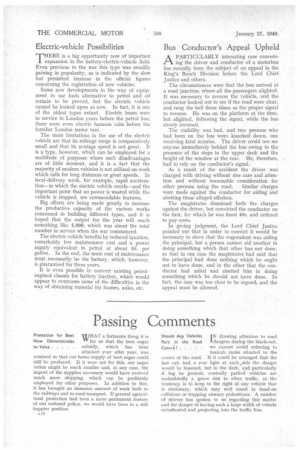Electric-vehicle Possibilities
Page 14

If you've noticed an error in this article please click here to report it so we can fix it.
THERE is a big opportunity now of important expansion in the battery-electric-vehicle field. Even previous to the war this type was steadily gaining in popularity, as is indicated by the slow but persistent increase in the official figures concerning the registration of new vehicles.
Some new developments in the way of equipment to use fuels alternative to petrol and oil remain to be proved, but the electric vehicle cannot be looked upon as new. In fact, it is one of the oldest types extant. Electric buses were in service in London years before the petrol bus; there were even electric hansom cabs before the familiar London motor taxi.
The main limitations in the use of the electric vehicle are that its mileage range is comparatively small and that its average speed is not great. It is a type, however, which can be employed for a multitude of purposes where such disadvantages are of little moment, and it is a fact that the majority of modern vehicles is not utilized on work which calls for long distances or great speeds. In local-delivery work, for example, rapid acceleration—in which the electric vehicle excels—and the important point that no power is wasted while the vehicle is stopped, •are commendable features.
Big efforts are being made greatly to increase the productive capacity of the various works concerned in building different types, and it is hoped that the output for the year will reach something like 5,000, which was about the total number in service when the war commenced.
The electric vehicle benefits by reduced taxation, remarkably low maintenance cost and a power supply equivalent to petrol at about 5d. per gallon. In the end, the main cost of maintenance must necessarily be the battery, which, however, is guaranteed for three years.
It is even possible to convert existing petrolengined chassis for battery traction, which would appear to overcome some of the difficulties in the way of obtaining material for frames, axles, etc.
Bus Conductor's Appeal Upheld
APARTICULARLY interesting case concerning the driver and conductor of a motorbus has recently been the subject of an appeal in the King's Bench Division before the Lord Chief Justice and others. The circumstances were that the bus arrived at a road junction, where all the passengers alighted. It was necessary to reverse the vehicle, and the conductor looked out to see if the road were clear, and rang the bell three times as the proper signal to reverse. He was on the platform at the time, but alighted, following the signal, while the bus slowly reversed. The visibility was bad, and two persons who had been on the bus were knocked down, one receiving fatal injuries. The driver could not see anyone immediately behind the bus owing to the presence of the steps to the upper deck and the height of the window at the rear. He, therefore, had to rely on the conductor's signal.
As a result of the accident the driver was charged with driving without due care and attention and without reasonable consideration for other persons using the road. Similar charges were made against the conductor for aiding and abetting these alleged offerices.
The magistrates dismissed both the charges against the driver, but convicted the conductor on the first, for which he was fined 40s. and ordered to pay costs.
In giving judgment, the Lord Chief Justice pointed out that in order to convict it would be necessary to show that the respondent was aiding the principal, but a person cannot aid another in doing something which that other has not done, so that in one case the magistrates had said that the principal had done nothing which he ought not to have done, and in the other that the conductor had aided and abetted him in doing something which he should not have done. In fact, the case was too clear to be argued, and the appeal must be allowed.




















































